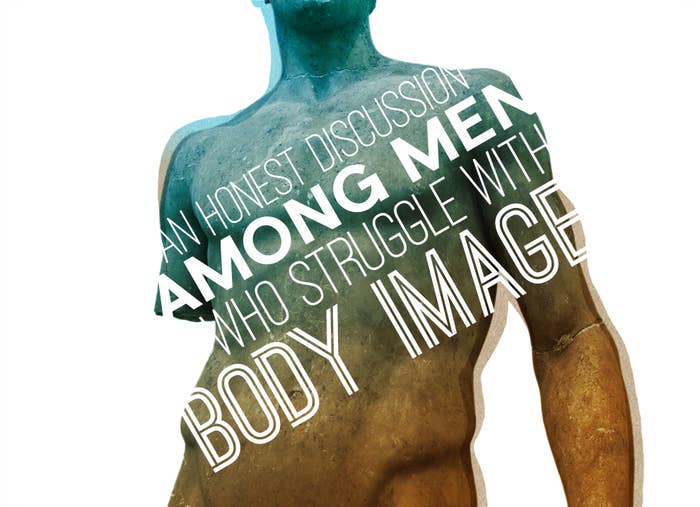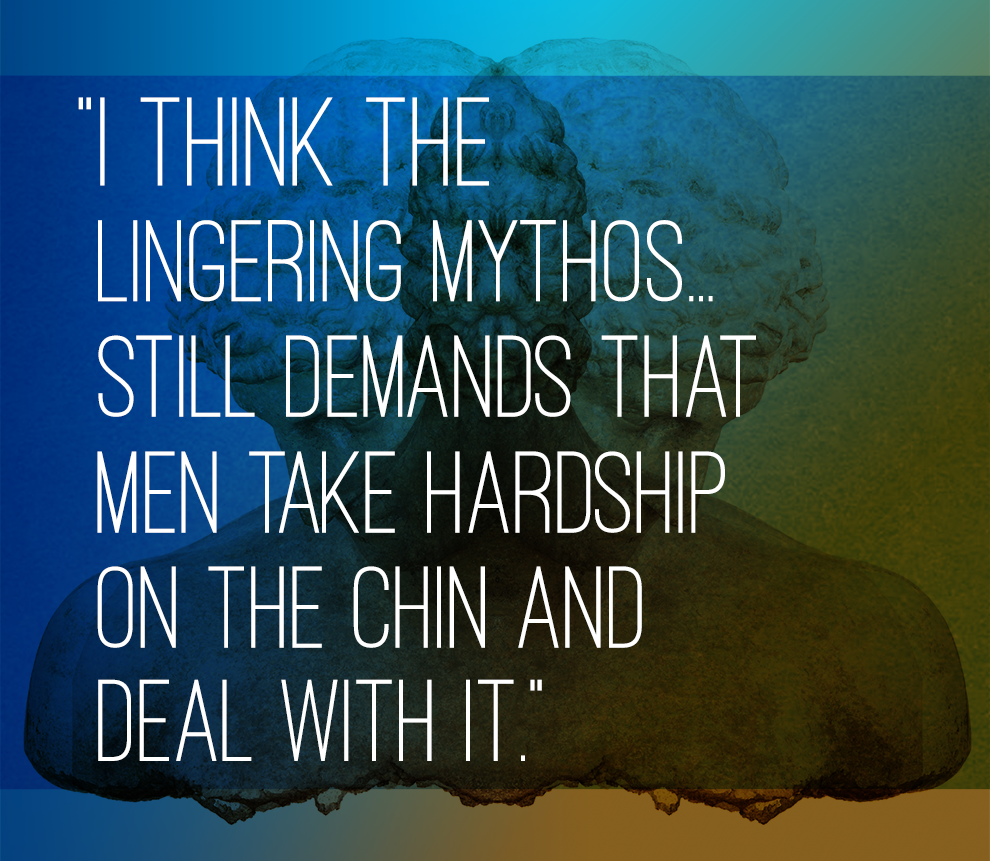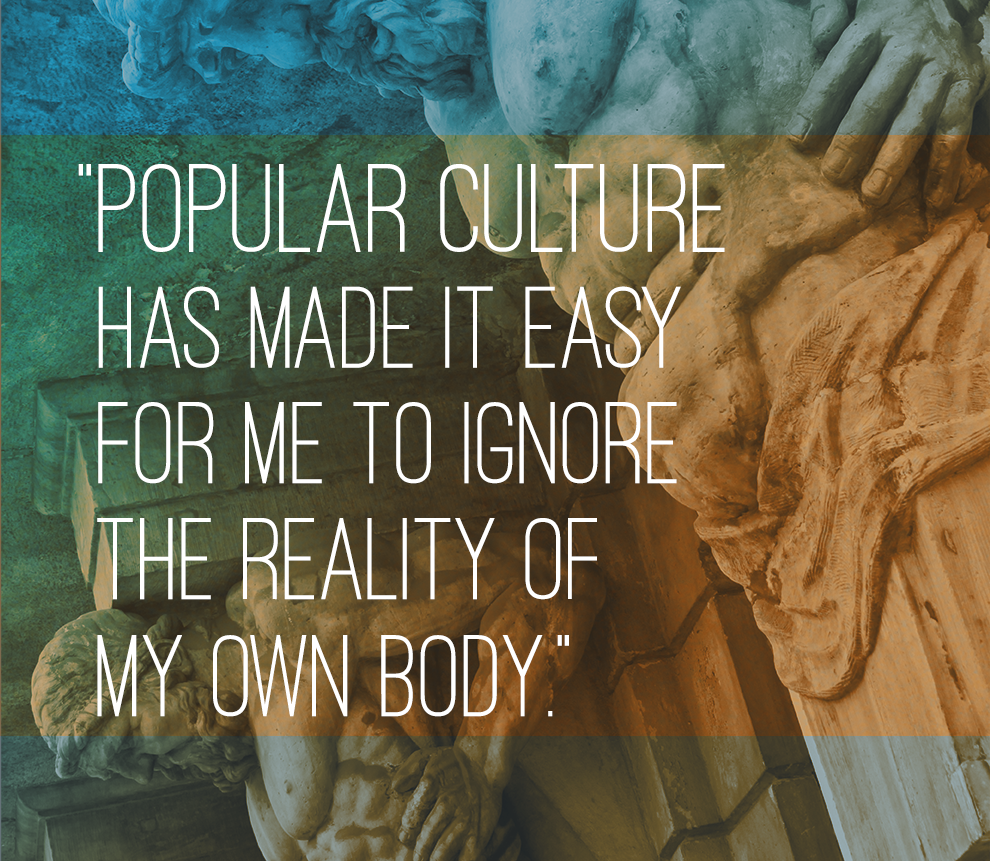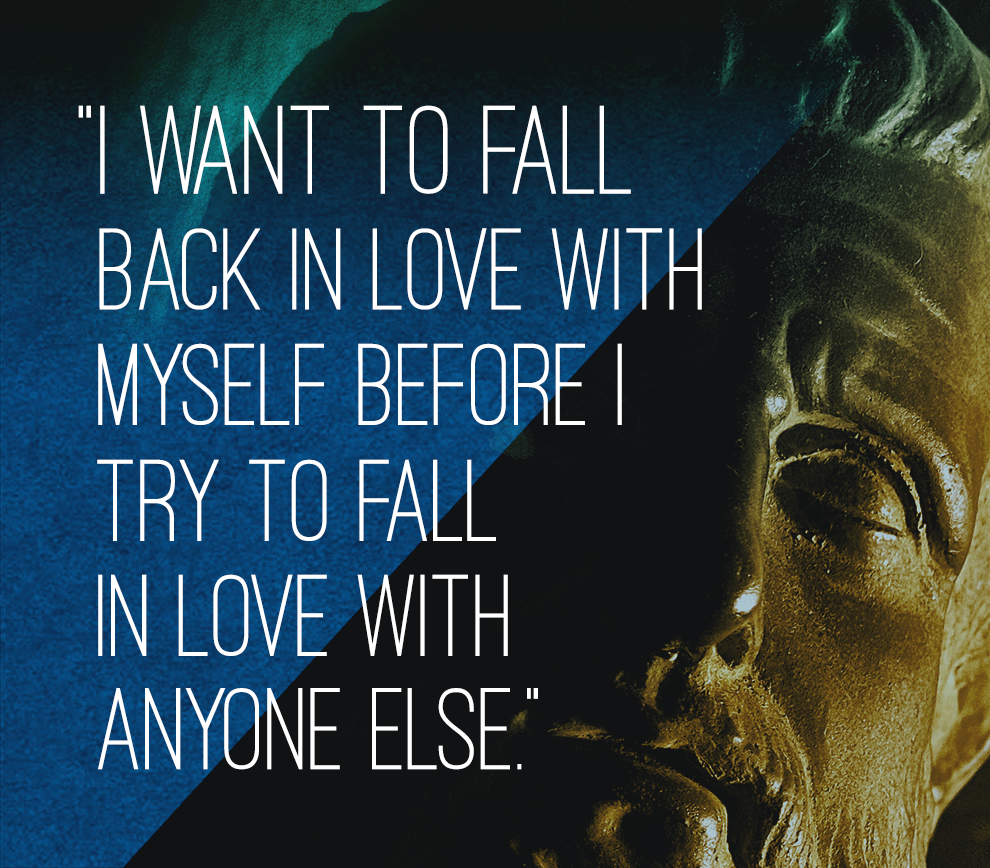
Few and far between are the honest conversations between men about their bodies, their insecurities, and their perceptions of how they look. This is an online conversation among five men that begins to address body-image stigma and the spectrum of perspectives that encompass this issue.
Tell us a little bit about yourself.
Jean-Luc Bouchard: I'm a humor writer at BuzzFeed. I'm 23 years old and have pretty much always worried about my weight and my size, and their association with my health. I've experienced a fair amount of weight fluctuation, especially in the last four years, and am actively trying to strike a happy medium in my body and mind.
Will Varner: I'm an illustrator here at BuzzFeed. I'm 42 years old, but I still view myself as I was when I was 13 — chubby, slow to develop, squeaky-voiced, and really insecure.
Brett Vergara: I'm an associate community manager here at BuzzFeed, and I'm 23 years old. My relationship with my body, like my weight in general, has certainly been all over the place. I definitely would have considered myself a "chubby kid," at some times more than others. I think I've developed a much healthier body image since graduating college, but even so, I still have my hurdles.
Saeed Jones: I'm BuzzFeed's executive editor of culture and I'm 29 years old. To be frank, for the last few years I've simply tried to pretend my body didn't exist because that seemed easier than facing the fact that I'm a chubby gay black man in a city seemingly overpopulated with perfect-looking gay men. I recently joined a gym and got a personal trainer, and I'm already feeling much more confident. I'm definitely a work in progress.
Isaac Fitzgerald: I'm the books editor here at BuzzFeed. I'm 32 years old, and I have never felt skinny enough.

How do you talk about your body, and who do you talk about it with?
IF: I usually try to avoid the conversation. I've picked up that lacking confidence in one's image isn't very sexy, so for most of my life I would just grin and bear it. But I've been trying to become better at being open about my own body-image issues. The older I get, the more I accept myself for who I am — not only by appreciating my body more as it is, but also by being honest about the fact that I'm not always happy with myself. I still have some growing to do in that sense.
JB: As a kid, I avoided that topic as much as humanly possible. Nothing in the world had the power to make me feel worse than a family member raising the topic of my weight. Just thinking about it now makes me sweat and clench my fists. I've opened up a lot more in the past few years, but when I talk about my body it's still almost always attached to the topic of health. To talk about myself as someone to look at or be noticed is still very, very hard, and especially so with men.
SJ: My poetry and essays often interrogate the expectations we hang upon black queer bodies. In stark contrast, I usually do everything possible to avoid talking about my body out loud because there's not much to say beyond "I loathe this body I'm encased in." Every once in a while, I'll open up to very close friends, but only the ones who have a similar relationship to their bodies.

What parts of your body are you insecure about? Do you remember when or why these insecurities began?
BV: I've always been really self-conscious about my frame feeling too wide, and I'm a bit shorter than average so that ties in with that, for sure. Also, since I'm shorter, my body mass index always bothered me a lot when I was a kid (because I didn't really know how bullshit BMI was at the time). It served as a method of measurement that constantly reaffirmed my negative body image.
SJ: When I was growing up, I was really skinny — all legs and teeth, basically. An uncle said once that he was worried I'd get blown down the street if it was too windy outside. But then life happened, work happened, losses and grief happened, and one day I found myself staring at a beer belly. I was horrified. Life comes at you fast, man.
WV: I'm happy overall with my body now (most days), but when I do feel insecure it is usually my love handles or the fact that I feel disproportionate — that my chest is too big, or my arms and neck are too scrawny, or that my thighs are freakishly big. I remember being terrified for a while that my penis was too small or just plain weird. I also went through a phase where I HATED that my hair was getting thinner.
JB: I've always felt fat, and that probably has something to do with how early and often I was called heavy (or worse) by my family, classmates, doctors, and teachers, as well as the fact that I am a naturally large dude. When I was at my heaviest, strangers and peers alike would often refer to me as "jolly" for no discernible reason except my size, so I still very much have this Santa Claus image of myself stuck in my head. I hate my stomach more than anything else on my body, and I sometimes daydream about slicing it off or sucking it out with giant syringes. I'm also particularly self-conscious about my butt, my thighs, my love handles, my chest, my neck, and my hair.
IF: I have always felt overweight, no matter what my weight was. I was eight when my ma once slapped my stomach in a Stuart's (like the Walmart of New England). She herself had been overweight as a child, and she really only wanted me to be fit so that I could be spared what she had gone through. But I'll never forget her lifting up my shirt in front of the mirror in the changing room, and how she slapped my stomach, making it jiggle. That was when I started feeling self-conscious about my belly. I've also felt short since I was a teenager. This led to me wearing cowboy boots for most of my teenage years and well into my adult life, right up until last year.

How does media and popular culture affect how you perceive your own body?
WV: Growing up, I loved comic books, movies, and TV shows. I was really hungry for images of powerful, masculine figures, and so I idolized superheroes and action stars. I thought that by emulating the way they looked I could be a "real man" someday. I also wanted attention from others and understood pretty early on that there was a connection between the way some boys looked and the type of attention they got.
JB: Popular culture has made it easy for me to ignore the reality of my own body, and of the diverse body types of other men, which in turn has made it difficult to accept who I am as a living, breathing mammal. I've always been drawn to images of men who are very skinny and tall, like Jack Skellington or Jafar or The Riddler. When I sketch comics or create characters for video games or Dungeons & Dragons–type role-playing games, I almost always end up with a man who is lanky and nimble to the point of impossibility, because in reality I feel more lumbering and in the way than anything else.
SJ: I've given up on caring what media and pop culture thinks about the bodies of men like myself. It's exhausting.
How has your relationship with your body affected your love life?
IF: To be totally honest, it has probably driven some unhealthy times in my life. Because I didn't accept myself, I was motivated to find acceptance through the want/love/desire of others. Of course, sex and companionship, whether it's a one-night stand or something longer-term, can be a wonderful thing. But I think a lot of my promiscuity was driven by a lack of self-acceptance.
JB: It's made my love life more complicated than it needs to be, for sure. I have a very hard time believing someone who says they find me attractive, and it can take a while for me to accept these kinds of statements and feel like an equal half of a partnership. If I like someone, my gut reaction is usually to acknowledge that I am too large for them, and that it would be unfair for them to have to date me. I'm trying to break that cycle, but it requires a lot of trust in the kindness of others.
BV: I think that self-consciousness is definitely in the back of my head when I'm in the dating scene, especially when some people have height requirements flat-out listed in their online dating profiles with statements like "Shorter than 5'10" — need not apply." It's completely understandable that some people have those preferences, but that doesn't change how it feels to read something that so bluntly dismisses who I am.
SJ: Right now, I'm focusing on working out and taking my health more seriously than dating. I want to fall back in love with myself before I try to fall in love with anyone else. If you're besieged by your own insecurities, you're not going to be able to truly see another person. That's not fair to them or you. So, I'm starting with me, then I'll leap.

Do you think men's body-image issues are discussed often enough or accurately enough?
WV: I think there's a lot of room for real discussion about men's body issues. The rates of eating disorders and other body image–related issues are rising, so there's quite obviously a problem. I think the lingering mythos of "masculine strength" still demands that men take hardship on the chin and deal with it, no complaints allowed. When men do talk about their feelings, they risk shattering that myth, so men end up feeling shame for not having the "perfect" body and then feel even more shame for feeling bad about it. It's toxic.
SJ: Not at all. We have so much to do, but nothing will change culturally until we begin to interrogate sexism and these retrograde notions of masculinity that we're still using to measure ourselves and one another.
JB: God, no. Basically the only time I feel comfortable raising this topic in public is when I do stand-up, and that's all under the guise of comedy. People are still a lot more comfortable with men's (and women's) bodies serving as punchlines versus being legitimate and serious points of discussion.
BV: Definitely not.
IF: No.
What can men do to help other men achieve a healthier relationship with their body?
WV: Men should be able to talk to other men about their health (both mental and physical) without worrying about being ridiculed or ashamed. In general, men could be more thoughtful about the things they say and do to other men. As a society we really praise those athletes who we see as having the right body while we can be really nasty to those who don't fit into that narrow box. We can be more kind to each other and more honest about our insecurities. We might focus less on trying to be "real" men and worry more about being "real" human beings.
IF: I think it's important that we have more conversations around how we feel about our own bodies. It's so easy to just assume that you're the only person who feels a certain way about yourself. But if you talk with others, and accept them the way they are, and respect the way they look, it can really help you find self-acceptance.
BV: I think it really comes down to being a bit more willing to talk about these kinds of things, and listening with more sensitivity and empathy. When men do try to talk about body-image issues, the conversation often devolves into a bunch of humor between guys, making little jabs at each other or just ignoring it. It's a reaction that's somehow been instilled in us, to just brush it off and make it no big deal. We can fight that instinct.
JB: Love each other, and love yourself in a way that doesn't hurt others. So many terrible moments and memories of our bodies could have been remedied with kindness or empathy on the part of others and ourselves. Be nice, be patient, and don't turn away from the truth of what hurts.
SJ: We can be more honest with ourselves and each other. Answering these questions has been both liberating and painful, but this is the work we have to do. Our lives may well depend on it.

All this week, we're talking about mental health. If you enjoyed this post, you might also like these:
* 8 Things No One Tells Guys With Body Image Anxiety
